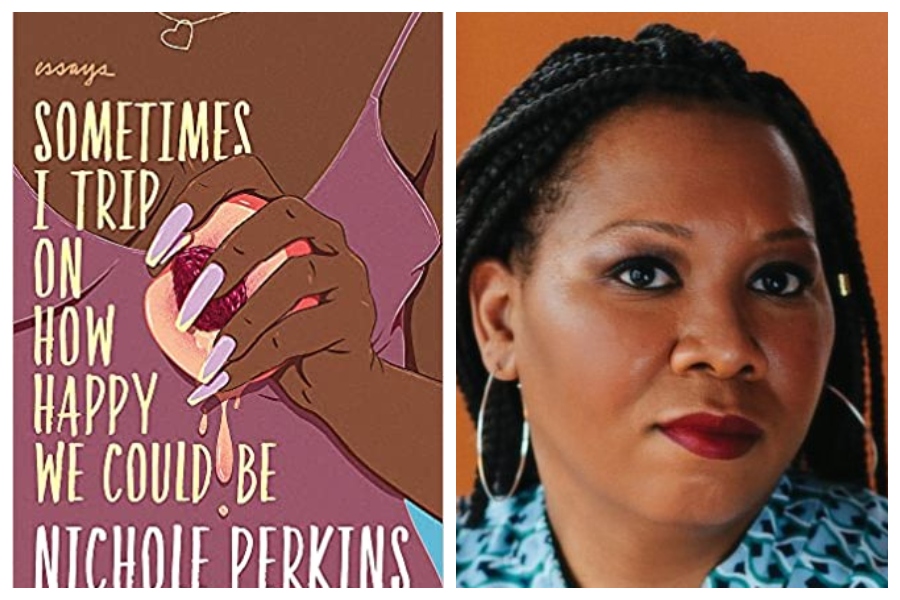
Source: Nichole Perkins/Grand Central Publishing / Grand Central Publishing
Recently, poet, podcaster and writer Nichole Perkins released her first memoir “Sometimes I Trip On How Happy We Could Be.” The collection of essays explores themes of feminism, Black womanhood and Southern sensibilities. We had a chance to speak to Perkins about her work, the importance of pop culture in our lives and what she wants Black women specifically to take from her book.
MadameNoire: What led you to write this book?
Nichole Perkins: In 2017, I got a Culterati Fellowship at BuzzFeed. I had been writing about pop culture, paid anyway, since about 2013. So I had these ideas about how pop culture shaped my life. But the fellowship at BuzzFeed really helped me see that yes, maybe people do want to read it. It’s not just an empty desire. Then I was accepted into the Jack Jones Retreat that Kima Jones founded. And I used that time later that year.
I was also inspired by the fact that Roxane Gay’s Bad Feminist had done so well. And I was also reading Samantha Irby’s personal essays which were really funny and great. So I was interested to see if there was room for me to be able to talk about the way being raised in the South, pop culture and being a Black woman all mixed together to create me.
MN: What role do you feel pop culture has played in the way Black women view our pleasure and our sensuality?
NP: It’s a really important role. Pop culture is the way we distill everything that’s going on in our life and make it easier to digest. For so long, we’ve only seen Black women in certain roles. I always think of Lieutenant Uhura’s character from “Star Trek” who affected Whoopi Goldberg, who became a comedian and actor and also affected Mae Jemison who then became an astronaut. So we have two very different careers coming from this pop culture character. I think that we can see more of that if people talked about the things that they watch.
You don’t really know what’s out there until you can see it or you hear other people talking about it. Pop culture’s very important because we can see things we otherwise would not have seen. It can shape how you see yourself.
I was in my late teens and early twenties when video vixens started poppin. Even though I was an adult at that point, it was very much like, ‘Oh, is this how I should be looking? Am I ok with not looking like that?’
There’s good and bad in pop culture but it definitely has an influence on our lives.
MN: The title of your book are the lyrics from a Prince song (“If I Was Your Girlfriend”) and you dedicated your book to him. Why was he so important in you development?
NP: Prince was so important to me because I had never seen anybody like him in my very young life. It was really unusual to see someone who was this blend of masculine and feminine. And even though he got a lot of crap for it, he was like this is who I am and you’ll have to deal with it. That struck me. I never wanted to be androgynous like him. But I did realize that the way I wanted to be considered a woman or a girl was not the way other people told me I should be a girl.
So I looked to him to have the confidence in how I expressed myself on the outside. But also, I recognized that his sexuality and the way he talked about certain things in his songs, they just hit me in a certain way. They stuck with me. I found a commonality in him. He was able to express things that I was not allowed to.
MN: How have you seen the conversation around Black women’s pleasure and sexuality change over time? And in what ways have they stayed the same?
NP: I think women, particularly Black women, have become bolder, confident, more self-aware. They’re also more impatient. And that’s a good thing because we have been told that ‘You have to sit there and tolerate everything that’s been thrown at you until you can’t tolerate it anymore.’ You should not get to the point where your back is breaking from the things that you have to carry just to be considered a good person, a good woman, a good Black woman.
I also think Black women are becoming more experimental in the things that they try sexually and romantically. I think Black women are more confident about dating outside of their race. Some Black women are expanding their gender preferences. They’re looking to explore that.
The things that I think stay the same: we still have to unlearn shaming other people or making other people feel bad for not doing the things that we do. I think we need to recognize that everybody is different. Just because you weren’t raised like me doesn’t mean that you’re less Black or less confident. It’s just that we have different experiences. And that is another thing I wanted to showcase with the book. There is all types of diversity in Blackness. In American Blackness, in Southern Blackness. There’s a lot that happens. There are many different ways to be a Black woman. There is no one way.
The most important take away I want for people, especially Black women, is that you’re never done. You’re never finished. You’re still evolving and growing. It’s never too late to change your mind and try something else.
Sometimes I Trip On How Happy We Could Be is available now.


